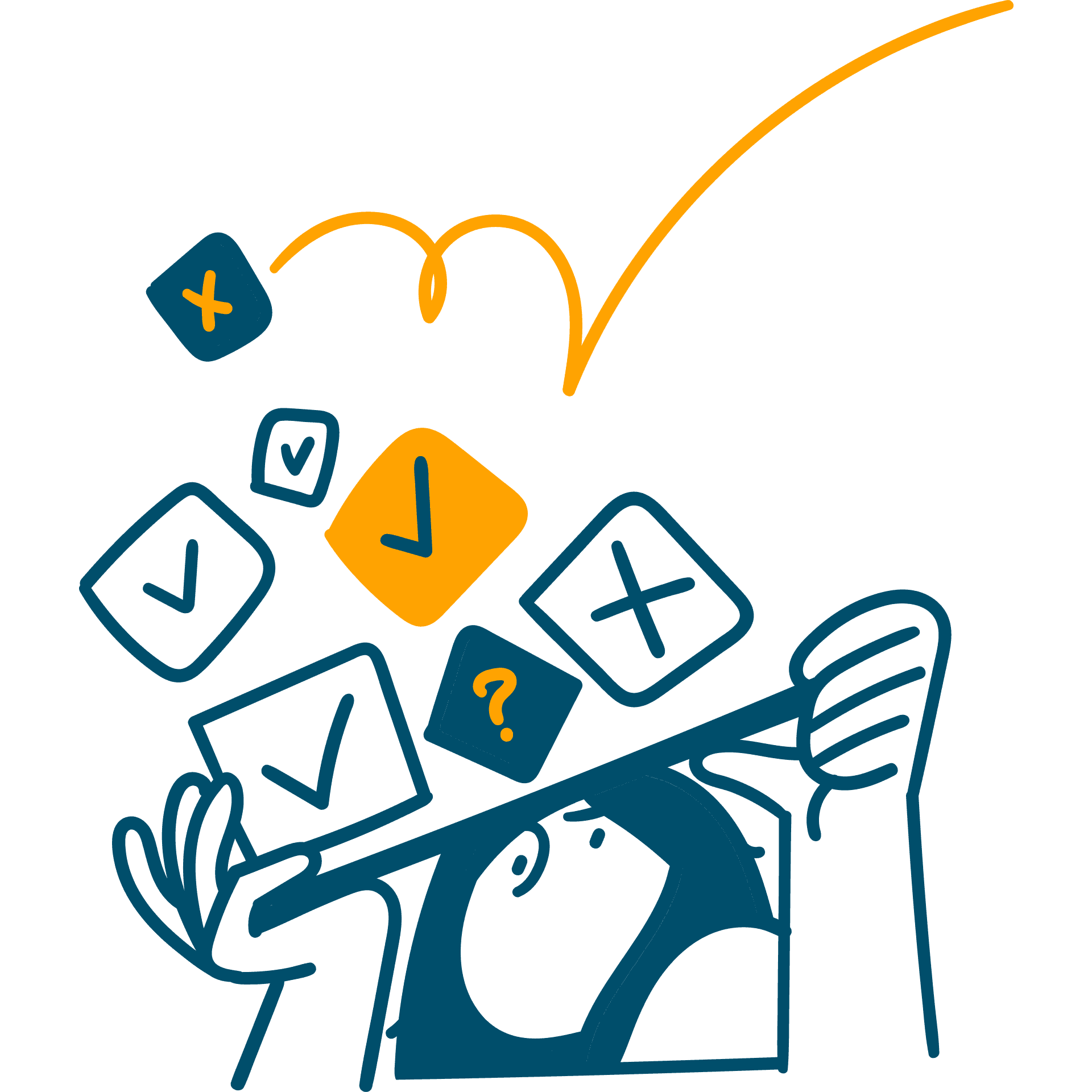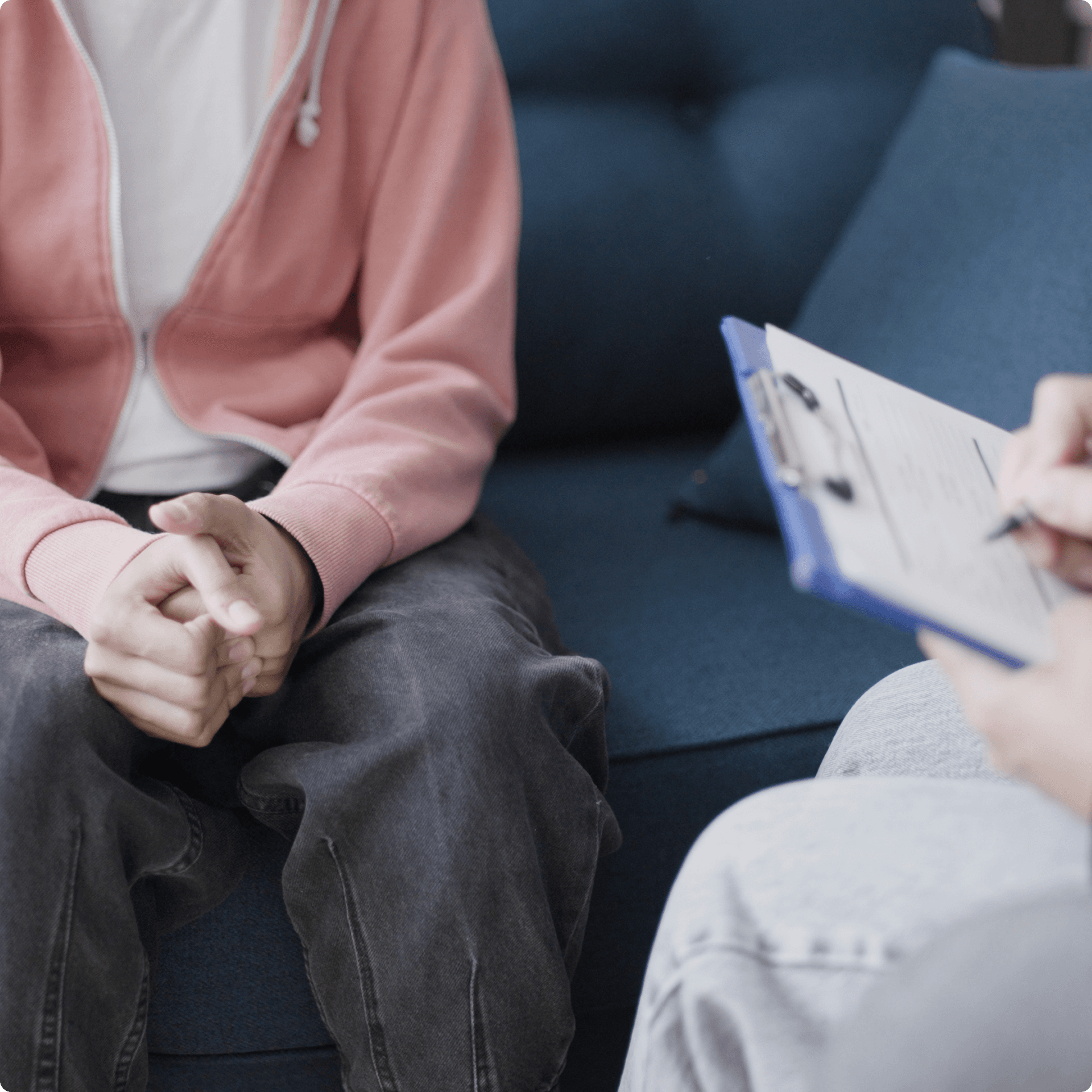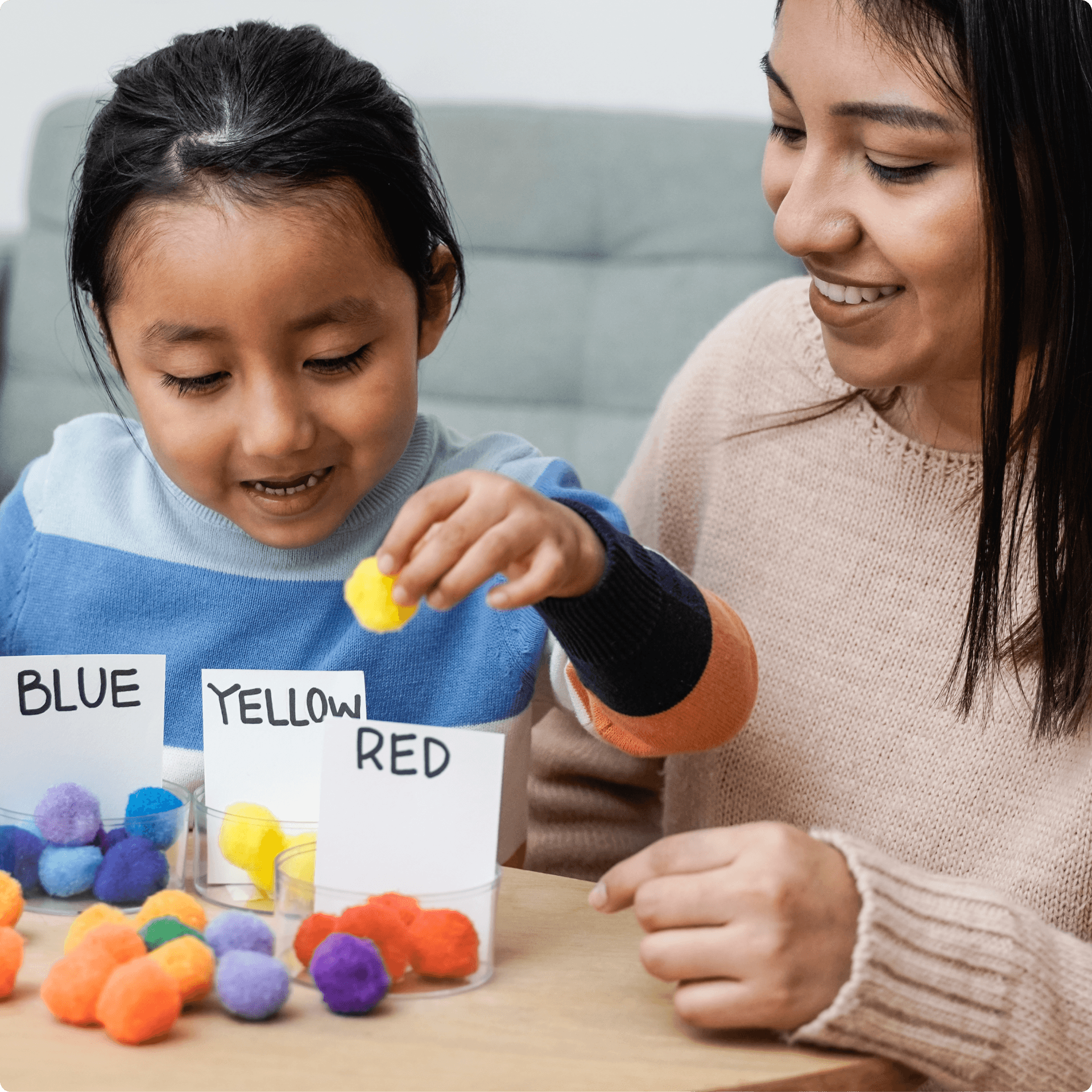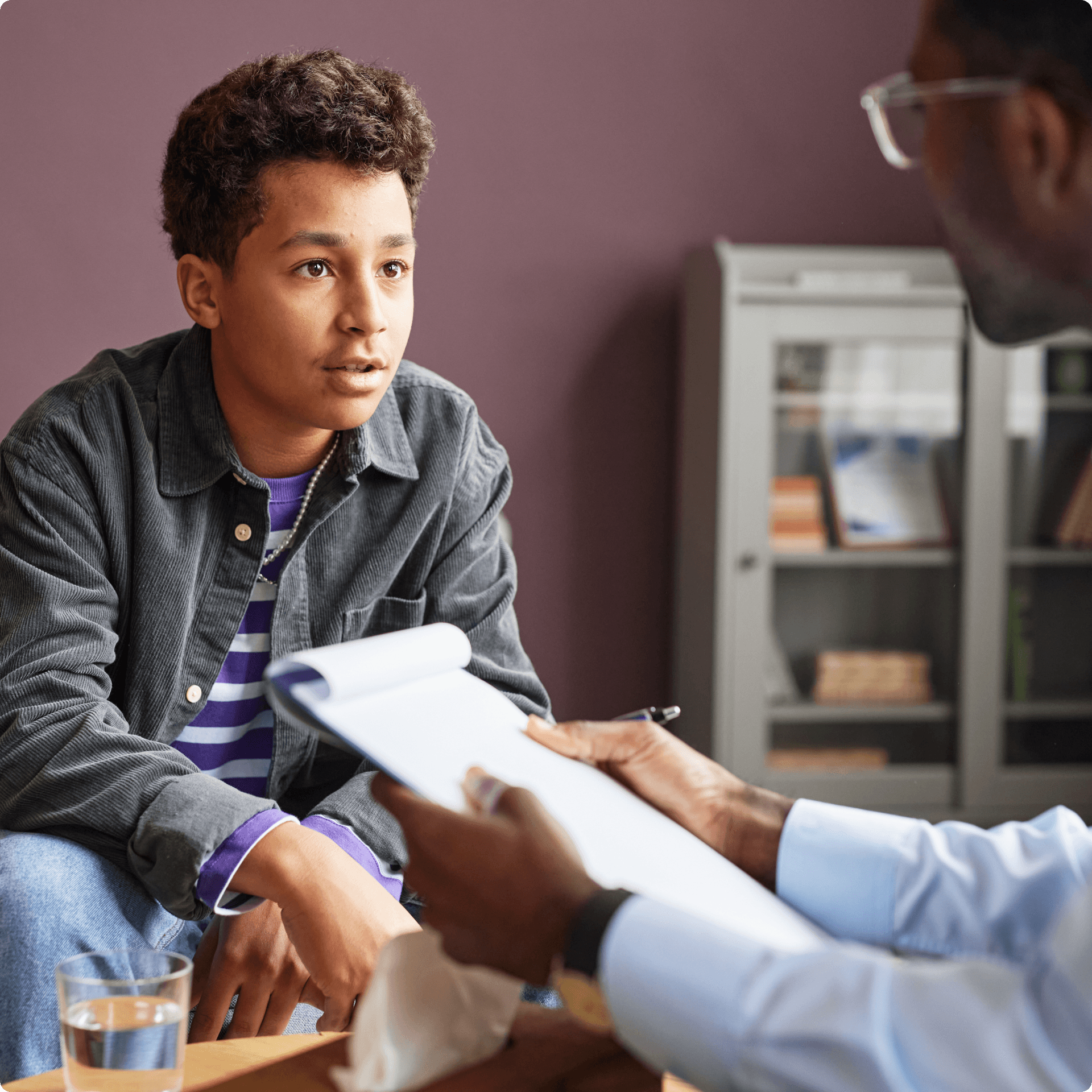Obsessive Compulsive Disorder (OCD) Program
When OCD is part of a child’s life, their experience with it is unique to them. As a parent, we recognize that makes the challenges you face unique, too. Just understanding your child’s thoughts and behaviors can bring hope and relief to your whole family.
At Brightline, we are committed to excellence and delivering individualized care built on empathy, trust, and proven expertise. Our compassionate approach combines with evidence-based exposure treatment to help kids with OCD feel safe, strong, and supported.

When is the OCD Program right?
These are some of the obsessive compulsive symptoms we see the most. If you’re seeing some of these (or others) at home, we can help you understand why and address them.

Repeated or ritualized behaviors driven by anxiety or fear
Overdoing things more than is needed
Intrusive thoughts that cause distress
Fear of not doing something just right; avoidance
The elements of care for OCD

Evaluation
Care begins with a diagnostic evaluation, which at Brightline is a series of three appointments. These appointments are vital to helping us get to know you and your child. They give you clarity and build the foundation for care — we will deeply understand your concerns, explore any related needs, and create a care plan that is evidence-based, individualized, and geared towards progress.
Our goal is to schedule these sessions as close together as possible for continuity, engagement, and convenience.
The first two of the three sessions involve you and your child in largely separate conversations — one with you only, and one with a focus on your child (you’re involved as needed, depending on your child’s age, stage of development, and ability to engage).
The third session is the evaluation follow up. This is a highly interactive and collaborative opportunity to share our impressions, discuss what we know about concerns, and arrive at a research-based treatment plan.

Evaluation
Care begins with a diagnostic evaluation, which at Brightline is a series of three appointments. These appointments are vital to helping us get to know you and your child. They give you clarity and build the foundation for care — we will deeply understand your concerns, explore any related needs, and create a care plan that is evidence-based, individualized, and geared towards progress.
Our goal is to schedule these sessions as close together as possible for continuity, engagement, and convenience.
The first two of the three sessions involve you and your child in largely separate conversations — one with you only, and one with a focus on your child (you’re involved as needed, depending on your child’s age, stage of development, and ability to engage).
The third session is the evaluation follow up. This is a highly interactive and collaborative opportunity to share our impressions, discuss what we know about concerns, and arrive at a research-based treatment plan.
How does therapy for OCD work?

Initially, treatment focuses on continuing to help your child learn about themselves and the symptoms they’re experiencing. We use this time to enhance their exposure plan, identify ways to track progress, and create reinforcement plans collaboratively with both kids and their parents. We continually address any barriers and co-occurring conditions as we build trust with your family and your child.
When it comes to OCD treatment, the core component focuses on designing and going through an exposure plan that includes both in-session interventions and between-session practice. Sessions often primarily center on the child or teen but do include parental education and support. However, for some kids, care may be more focused on supporting the parent.
The length of care hinges on how care is progressing, especially if we’re addressing multiple needs. You as the parent (and our partner) will help us rank the top problems and will complete standardized questionnaires as one way of providing feedback about how you feel treatment is progressing. Progress is measured weekly and monthly.
Care ends when the family and therapist collaboratively determine it’s time to wind care down or if a different need is identified. This is when we work together to reinforce the skills your child has learned, celebrate successes, discuss relapse prevention strategies, and create a “what if” plan for when a return to care might be needed.
Therapy sessions are usually 55 minutes long and psychiatry sessions are 30 minutes long.
Hear what Brightline parents have to say
“We have had the best experience with Brightline. My daughter has been able to use the techniques given by her therapist and it really has helped her. I would recommend Brightline to anyone who feels their child could benefit from therapy and learning coping mechanisms for everyday life. Our family and her teachers already see a difference in her and I am so happy. She looks forward to every session.”

OCD Program FAQs
What is Brightline’s approach for supporting kids with OCD?
Exposure response prevention (ERP) is the most prevalent evidence-based intervention for OCD and the primary one we use at Brightline. ERP can be tough at first, because it asks the person with OCD to get exposure by confronting the things that are provoking their obsessions. The response prevention part refers to learning to be in that “triggered” state and making a conscious choice not to do the compulsive behavior that they’re used to. ERP is done slowly, and under the close supervision of the child’s therapist — we know how hard it is to face the very things that make a child struggling with OCD feel anxious and fearful. It takes time. Eventually though, kids learn how to manage their symptoms at home, school, and anywhere they may occur. Over time, this practice of exposure and response prevention teaches their brain that what they’re obsessing over is not actually a threat or something to fear. Much of how we treat OCD is proven effective for kids with anxiety as well.
What’s the difference between normal routines and OCD behaviors?
Routine is comforting; OCD involves distressing, repetitive thoughts or rituals your child feels compelled to do and that significantly interfere with your lives. Evaluation clarifies whether these patterns are signs of OCD.
How do you help kids who feel trapped by their thoughts or routines?
We start by helping them feel safe and understood. Our clinicians teach that thoughts and behaviors don’t define who they are. And when kids learn to boss back to that insistent OCD voice, they begin to realize that their worries are manageable.
Is OCD treatable?
Yes. With the right diagnosis and intervention, kids can work toward remission of OCD (meaning they no longer meet criteria for the diagnosis).
How do you support kids who feel scared or ashamed of their thoughts?
We help kids identify these thoughts as OCD, not themselves. We remind every child that their thoughts do not define who they are — and their thoughts don’t have to always make sense. Science drives our methods, and we deliver care with compassion, not shame. We help kids understand what is happening safely and help them begin to separate their identity from OCD.
What if my child feels embarrassed to talk about their rituals or fears?
We build trust and confidence through humor, warmth, progress, and genuine connection — so when your child is ready to share, they know they’re in a safe, accepting place.
How do you bring empathy into every interaction?
We see the child and the family, not just the condition. Every session begins with curiosity, kindness, and respect for your child’s courage. Our clinicians balance expertise with heart — because healing starts when kids feel truly understood.
My child hides their rituals from me. Can you still help?
Yes. Our clinicians use proven approaches, open-ended conversations, collaborative behavioral experiments, and clinical observations to identify hidden patterns. Building trust and helping families reach their goals is our priority.
What if my child fears being “crazy” for their thoughts?
We help kids identify their OCD as thoughts, not as part of their identity or as themselves. Helping them understand what OCD is — and isn’t — reduces shame and fear.
How do you build trust with kids who are afraid to talk about their fears?
We work to create a safe space from the start, helping kids and teens realize they’re not alone. That trust becomes the foundation for healing and growth.
Get in touch with us
It's okay if you don't know the root of the issue or are unsure what to say. We've been there — and now we're here for you.


